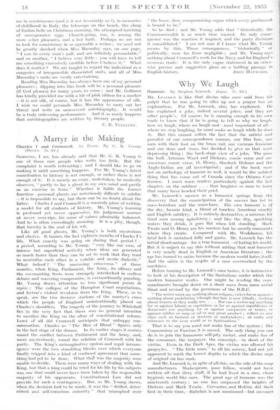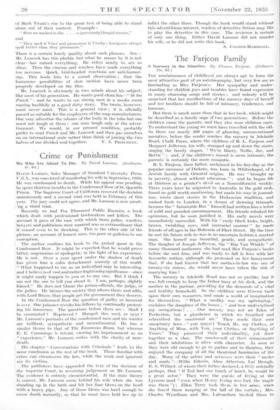Why We Laugh
Humour. By Stephen Leacock. (Lane. 75. 6d.) Ma. LEAeock is like that diVine who once said freen hey pulpit that lie was going to offer up not a prayer but an explanation. For Mr. Leacoek, also, has explained. lie
has explained a joke, indeed several jokes, and they are other people's. Of course, lie is cunning enough in his own trade to know that if he is going to tell us why we laugh, how we laugh, where we laugh and--most important of all- - where we stop laughing, he must make us laugh while he does it. But this cannot soften the fact that the satirist and
parodist of our correspondence courses, our film fans, our men with their foot on the .brass rail, our vacuous feminine
and our dons and -isms, has decided to give us that most depressing thing : the back-stage view of a joke. The punt the bull, Artemus Ward and. Dickens, comic verse and un- conscious comic verse, 0. Henry, Sherlock Haines and the Anglo-Indian are ' all investigated ; and if the book were not an anthology of humour as well, it would be the saddest thing that has conic out of Canada since the Ottawa Con ference. I must warn readers particularly against the last
chapter, on the sublime . . . that laughter so near to' tctirl that many have howled their grief.
Mr. Leacock's success as a humorist springs from. 014 discovery that the emancipation of the masses has led ,to mass-boredom and the mass-bore: His own humour is .4 the dry, laconic kind, a blend of toneless American cruelty
and English subtlety. It is entirely destructive, a mixture tired men among upholstery ; and like the dry, sparkling waters they drink, it goes flat when left standing. Mark Twain and 0. Henry are his masters but be merely comments where they create. Compared with Mr. Wodehouse, leis fatal lack is sustained folly and gusto. Mr. Leacock has the initial disadvantage—for a true humorist—of hating his,world. But it is unjust to say this without adding that real humour is very nearly dead in English or American literature ; the age has turned to satire because the modern world hates itself. And the satire is the respite of a race overworked by tie
machines.
Before turning to Mr. Leacock',s own tastes, it is instructive
to look at his description of the limitations under which the modern humorist works. One might be reading the com- mandments brought down on a short wave from some aerial Sinai and revised by the governors of the B.B.C.
" The writer must say nothing about religion, either for or against ; nothing about prohibition (though that ban is now lifted) ; nothing about women as they really are. . . . Nor can a writer say anything for or against labour or capitalism or for or against republicans or democrats nor anything for or against companies or trusts, or against rubber or soap or oil or any great product ; reflect en any class such as farmers or dentists or undertakers ; or make any reference to the next world or to Spiritualism."
That is to say you must not make fun of the system ; like Communism or Fascism it is sacred. The only thing you can do. is to join the humorous self-pity racket, and make fun of the consumer, the taxpayer, the conscript,—in short of the
victim. • Even in the Dark Ages, the victim was allowed iteis gargoyles. "The little man," in all his misery, had not yet
appeared to mark the lowest depths to which the divine urge of original sin has sunk.
And Mr. Leacock is, in spite of all this, on the side of the soap manufacturers. Shakespeare, poor fellow, would not have written all' that dirty stuff, if lie had lived in a nice, clean hygienic world like ours. The great age of humour was the nineteenth century ; no one has surpassed the heights of Dickens and Mark Twain. Cervantes and Moliere did their best in their time, Rabelais is not mentioned—but Passages
of Mark Twain's rise to the great test of being able to stand alone out of their context. Example : " Here we washed in the . . . a (previously) limpid stream," and " They spell it Vinci and pronounce it Vinchy ; foreigners always spa better than they pronounce."
There is a certain lonely quality about such phrases. Sex— Mr. Leacock has this phobia but what he means by it is not clear—has ruined everything. He refers neatly to sex as slime. Then the cinema and wireless have, made everything too. nervous. Quick, bird-headed reactions are anti-humor- hus. This leads him to a sound observation ; that the humorous possibilities of slow motion have never been properly developed on the film.
Mr. Leacock is obviously in two minds about his subject, like most of his generation. He wants good clean fun—" fit for Punch "----and he wants to see strong men in a smoke room roaring healthily at a good dirty story. The twain, however, must never meet. This is a general view ; it is officially passed as suitable for the employees of the soap manufacturers.
One may 'advertise the odours of the body in the but one must not laugh at them ; one may laugh only at the adver- tisement. We would, in our present condition, probably prefer to read Punch and Mr. Leacock and then gas ourselves on an international scale rather than think of joining the two halves of our divided soul together. V. S. PRITCHETT.































































































 Previous page
Previous page